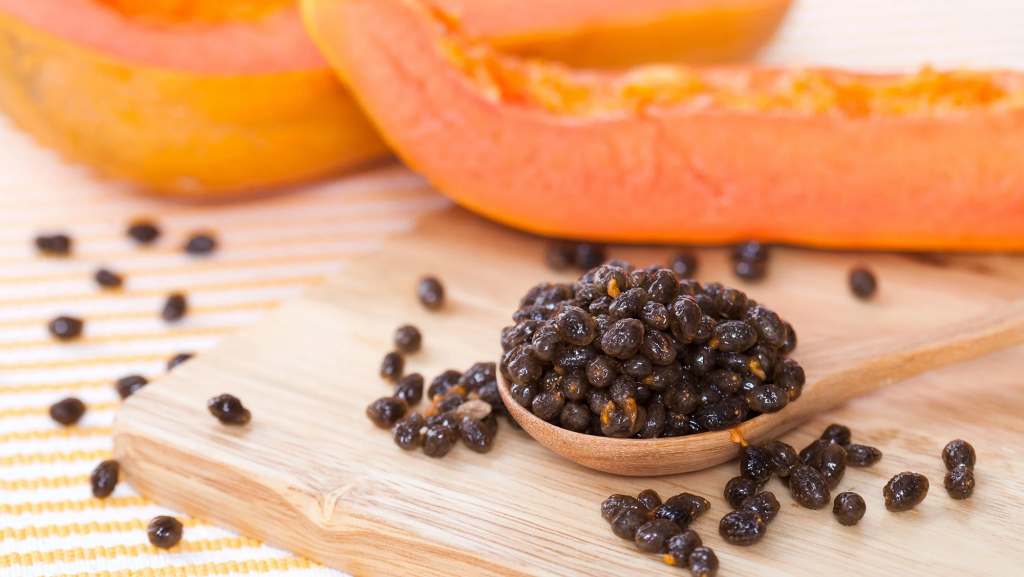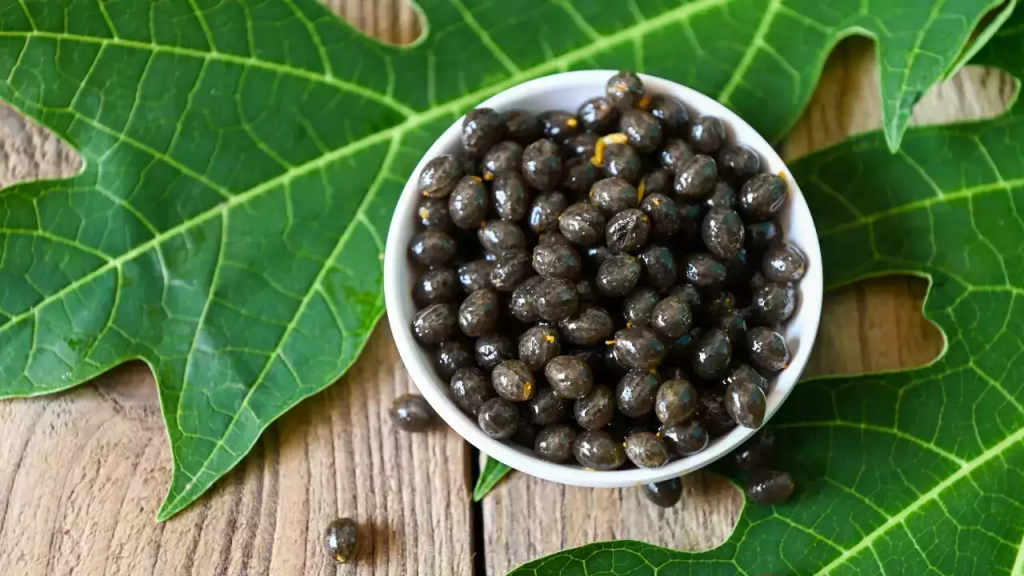Every year, Americans spend billions of dollars on over-the-counter medications for digestion, inflammation, and even minor infections. Yet, hidden inside the fruit bowl of many tropical households lies a remedy that has been used for generations—papaya seeds. While most people toss them in the trash, these tiny black seeds are packed with compounds that traditional medicine has long recognized for their potential health benefits.
What if something as simple as eating papaya seeds could support your digestion, protect your liver, and even help keep harmful bacteria in check—all without the price tag of a pharmacy visit? In this article, we’ll explore the surprising science, practical uses, and real-life experiences that make papaya seeds a hidden gem for health-conscious individuals. By the end, you’ll know exactly why these overlooked seeds might deserve a spot in your daily routine.

The Nutritional Power of Papaya Seeds
Papaya seeds are small but mighty. They contain essential nutrients, healthy fats, and powerful plant compounds that have attracted the attention of both researchers and natural health practitioners.
| Compound | Benefit |
|---|---|
| Papain enzyme | Aids in protein digestion and gut health |
| Carotenoids | Antioxidants that support immune defense |
| Flavonoids | Help fight oxidative stress and inflammation |
| Healthy fats | Support energy and nutrient absorption |
| Fiber | Improves digestion and regularity |
Unlike the sweet, juicy flesh of the papaya, the seeds have a peppery, slightly bitter taste. In many cultures, they are dried and ground to be used as a natural spice and remedy.

Digestive Health Benefits
One of the most common reasons people explore papaya seeds is for better digestion. Thanks to papain, a natural digestive enzyme, papaya seeds help the body break down proteins more efficiently. This makes them especially useful after heavy meals that might otherwise cause bloating or discomfort.
In traditional practices, papaya seeds are sometimes used to combat intestinal parasites. While more human studies are needed, some research has shown promising results in their ability to reduce harmful organisms in the gut.
Practical tip: Try chewing a small spoonful of raw papaya seeds after a meal. If the flavor feels too strong, blend them into a smoothie with pineapple or citrus for a more pleasant experience.
Liver and Kidney Support
Your liver and kidneys are the body’s natural filters, constantly working to eliminate toxins. Over time, poor diet, alcohol, and medications can strain these organs. Papaya seeds contain compounds believed to support liver health by reducing oxidative stress and encouraging regeneration.
Animal studies suggest that papaya seed extracts may help protect the liver from certain types of damage. Similarly, some evidence points to their role in supporting kidney function, though more human-based research is necessary.
Practical tip: For general wellness, some traditional approaches recommend drying the seeds, grinding them into powder, and consuming in small amounts with water or honey a few times a week.

Anti-Inflammatory and Antimicrobial Properties
Inflammation is at the root of many chronic conditions, from arthritis to heart disease. The flavonoids and phenolic compounds in papaya seeds may help reduce inflammation in the body. Some laboratory studies even suggest antimicrobial effects, meaning they could help inhibit harmful bacteria.
While papaya seeds are not a replacement for antibiotics or prescribed treatments, they may serve as a gentle, natural way to support your body’s defenses.
Practical tip: Mix crushed papaya seeds with a drizzle of lemon juice and olive oil as a salad dressing for a daily anti-inflammatory boost.
Weight Management and Metabolism
Another reason papaya seeds have gained attention is their potential role in weight management. Because they contain fiber and healthy fats, they promote satiety and may help reduce overeating. Some traditional uses also suggest papaya seeds can support metabolism by aiding digestion and fat processing.
Although research is still developing, many people include papaya seeds as part of a balanced diet to help manage cravings and maintain a healthy weight.
Practical tip: Add powdered papaya seeds to smoothies or oatmeal to boost fiber content and start your morning with sustained energy.

How to Safely Use Papaya Seeds
While papaya seeds can be beneficial, moderation is key. Eating too many can cause digestive upset due to their strong compounds. A general guideline is to start with 5–7 fresh seeds per day and gradually increase if your body tolerates it well.
Preparation methods:
- Raw: Simply chew after a meal.
- Dried and ground: Use as a pepper substitute in soups or salads.
- Smoothies: Blend with fruits to mask the bitterness.
Always consult your healthcare provider before adding papaya seeds to your diet, especially if you are pregnant, breastfeeding, or taking medications.

Conclusion
Papaya seeds may be small, but they hold big potential for supporting digestion, protecting vital organs, and even boosting natural defenses. Instead of discarding them, consider adding a modest amount to your daily routine as a complement to a balanced diet. Their peppery flavor and nutritional power could make them one of the most underrated health boosters hiding in your kitchen.
Frequently Asked Questions
Can I eat papaya seeds every day?
Yes, in moderation. Start with a few seeds daily to see how your body responds.
Do papaya seeds kill parasites?
Some studies suggest they may help reduce intestinal parasites, but more research in humans is needed.
Are there any risks?
Papaya seeds are generally safe in small amounts but may not be suitable for pregnant women or people with certain health conditions. Always consult a doctor before regular use.
This article is for informational purposes only and is not a substitute for professional medical advice. Always consult with a healthcare provider before making changes to your diet or treatment plan.




